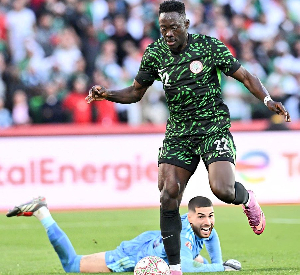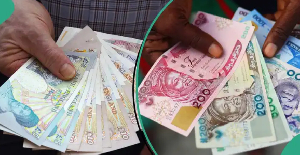Business News of Wednesday, 22 October 2025
Source: www.legit.ng
Naira rises as banks, dealers quote new dollar exchange rate
Naira strengthened against the US dollar, British pound and the euro in all foreign exchange markets, despite a sharp 32.9% decline in weekly inflows into the Nigerian Foreign Exchange Market (NFEM).
According to data from the Central Bank of Nigeria showed that the naira appreciated by 0.12% at the official market on Tuesday, October 21, closing at N1,463.45 per dollar compared with N1,465.29 on Monday.
The naira also appreciated against the pound sterling in the official market on Tuesday by N7.89 to close at N1,957.07/£1 compared with Monday’s closing price of N1,964.96/£1.
It also gained N4.47 against the euro to sell at N1,702.45/€1, in contrast to the preceding session’s N1,706.92/€1. At GTBank, the dollar is sold at N1,475 per $1, while the customs exchange rate for clearing goods remains at N1,740.
Naira exchange rate black market
It was a similar performance for the naira in the parallel market, also known as the black market.
Legit.ng spoke to several Bureau de Change operators, who confirmed that the value of the naira improved, with the buying and selling rates now below N1,500 a dollar.
Abudullahi, one of the BDC traders, told Legit.ng:
“On Tuesday, the dollar buying rate is N1,483, while the selling rate is N1,493. The euro sells for N1,750 and is bought at N1,720. The British pound sterling sells for N2,000, with a buying rate of N1,980.”
The CBN also provided the updated currency exchange rate changes below:
CFA: N2.62
Yuan/Renminbi: N205.51
Danish Krone: N227.46
Euro: N2,357.62
Yen: N9.64
Riyal: N390.20
South African Rand: N83.91
SDR: N2,001.56
Swiss Franc: N1,841.28
Pound Sterling: N1,957.07
US Dollar: N1,463.45
WAUA: N2,017.11
Forex inflow into Nigeria
A report by Coronation Merchant Bank’s research team revealed that total FX inflows through the NFEM dropped to $1.10 billion last week, down from $1.64 billion in the prior week, reflecting weaker market inflows.
Despite the contraction, foreign portfolio investors (FPIs) accounted for the largest share at 63.1% ($694.9 million), followed by exporters at 15.3%, non-bank corporates at 12.2%, the CBN at 1.3%, and other sources at 8.1%, BusinessDay reports.
Foreign direct investment (FDI), however, fell sharply to $0.20 million, just 0.01% of total inflows, compared with $122.2 million (7.5%) in the previous week.
Analysts said the drop is due to lingering investor caution over Nigeria’s macroeconomic environment.












